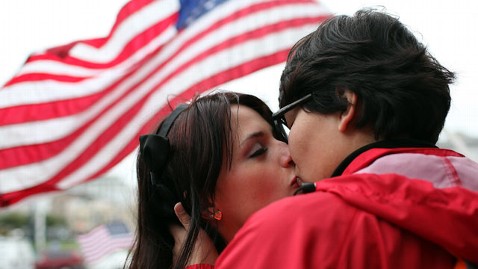California Prop 8 Headed to U.S. Supreme Court

Image Credit: Justin Sullivan/Getty Images
A federal appeals court in California has denied a petition to have Prop 8 -the 2008 California ballot initiative that defines marriage as between a man and a woman - further reviewed by a larger panel of judges, which means the case likely is headed to the Supreme Court of the United States.
In February , the majority of a three judge panel sitting on the Ninth Circuit Court of Appeals struck down Prop 8 ruling that the initiative "serves no purpose, and has no effect, other than to lessen the status and human dignity of gays and lesbians in California and to officially reclassify their relationship and families as inferior to those of opposite-sex couples." The court ruled on narrow grounds specific to California and Proposition 8. It did not find a fundamental right of same sex couples to marry.
Supporters of Prop 8 - opponents of gay marriage - had asked for "en banc" review of the case. This would have meant that the Chief Judge of the circuit along with 10 randomly selected judges would have mooted their colleagues' decision and started anew. But in a filing today the court said that a majority of judges had voted to deny the petition.
But the court stayed the three judge ruling pending an appeal to the Supreme Court.
"Today's order is yet another federal court victory for loving, committed gay and lesbian couples in California and around the nation," said Chad Griffin, the Co-founder of The American Foundation for Equal Rights, the group that brought the challenge to Prop 8.
"This is a great step forward towards the day when everyone will be able to marry the person they love," said AFER attorney David Boies.
But Andy Pugno, general counsel for ProtectMarriage.com, the official proponents of Prop 8, said his group will appeal the case to the Supreme Court.
"Perhaps the most positive news from today's decision is that the court has stayed the decision up to and including the time that the United States Supreme Court finally decides this case. We will promptly file our appeal to the nation's highest court and look forward to a positive outcome on behalf of the millions of Californians who believe in traditional marriage," Pugno said in a statement.
Three 9th Circuit judges -Diarmuid Fionntain O'Scannlain, Jay S. Bybee and Carlos T. Bea - wrote separately today arguing that a larger panel of the court should have taken up the case. In their dissent, the judges referenced President Obama's recent interview with ABC's Robin Roberts in which he said he personally supports same sex marriage.
"A few weeks ago, subsequent to oral argument in this case, the President of the United States ignited a media firestorm by announcing that he supports same sex marriage as a policy matter. Drawing less attention, however, were his comments that the Constitution left this matter to the States and that 'one of the things that he'd like to see is-that the conversation continue in a respectful way.' Today our court has silenced any such respectful conversation," according to their dissent.
But Judge Stephen Reinhardt and Michael Daly Hawkins - who authored the three judge panel decision - wrote separately to address the dissent . "We are puzzled by our dissenting colleagues' unusual reliance on the President's views regarding the Constitution, especially as the President did not discuss the narrow issue that we decided in our opinion." they wrote.
They stressed that in their opinion they had ruled narrowly that under the particular circumstances relating to California's Prop 8, the measure was invalid.
"We did not resolve the fundamental question that both sides asked us to: whether the Constitution prohibits the states from banning same-sex marriage. That question may be decided in the near future, but if so, it should be in some other case, at some other time," they said.
Today's ruling comes a week after a federal appeals court in Boston struck down a key provision of the Federal Defense of Marriage Act (DOMA). In that case, legally married same sex couples argue that the federal government is denying them benefits available to opposite sex couples.
The Supreme Court will most likely consider both the Prop 8 case and the DOMA cases next term.